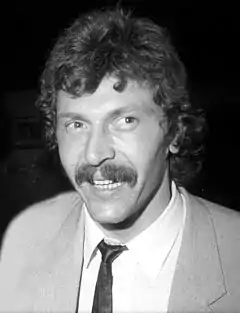Helmuth Duckadam
Helmut Robert Duckadam (Romanian pronunciation: [helˈmut dukaˈdam]; born 1 April 1959) is a Romanian retired footballer who played as a goalkeeper.
 Duckadam in 1986 | |||
| Personal information | |||
|---|---|---|---|
| Full name | Helmut Robert Duckadam | ||
| Date of birth | 1 April 1959 | ||
| Place of birth | Semlac, Romania | ||
| Height | 1.93 m (6 ft 4 in) | ||
| Position(s) | Goalkeeper | ||
| Youth career | |||
| 1974–1975 | Semlecana Semlac | ||
| 1975–1977 | Şcoala Sportivă Gloria | ||
| 1977 | UTA Arad | ||
| Senior career* | |||
| Years | Team | Apps | (Gls) |
| 1977–1978 | FC Constructorul Arad | ||
| 1978–1982 | UTA Arad | 53 | (0) |
| 1982–1986 | Steaua București | 80 | (1) |
| 1989–1991 | Vagonul Arad | 0 | (0) |
| Total | 133 | (1) | |
| International career | |||
| 1981 | Romania U21 | 4 | (0) |
| 1982 | Romania | 2 | (0) |
| *Club domestic league appearances and goals | |||
He was dubbed "the Hero of Seville" due to his performance in the 1986 European Cup Final, won by his club Steaua București, where he saved all four penalties against Barcelona in the penalty shootout, for the first time in football history. He represented three other teams in a 14-year senior career.
Duckadam regularly appears as a studio guest on Digi Sport's "Fotbal Club" programme.
Career
Born in Semlac, Arad County of Banat Swabian (German) descent, Duckadam started playing in his regional leagues, before moving to FC UTA Arad in 1978 to become professional. He earned two full caps for Romania in 1982 and, subsequently, was signed by country giants Steaua București.
Duckadam, who was instrumental in helping the capital side to two consecutive Liga I titles, was also between the posts for the 1986 European Cup Final against FC Barcelona, which was played in Seville, on 7 May 1986. He saved four consecutive penalty shots in the shootout, from José Ramón Alexanko, Ángel Pedraza, Pichi Alonso and Marcos, being the first one to do so in an official European competition. Steaua won the shootout 2–0 and Europe's most important club trophy for the first time, and much of the credit for the surprise victory was given to him; he scored one goal for his main club, through a penalty kick against AFC Progresul București in the domestic cup.[1] Duckadam was nominated for the Ballon d'Or in 1986.[2][3]
In 1986, Duckadam suffered a rare blood disorder only few weeks after the Seville performance,[4] and would only resume his career three years later, finishing it with lowly Vagonul Arad in the second division. According to a personal interview given in 1999, he had become a major with the Romanian Border Police (Poliția de Frontieră) in his hometown; additionally, he opened a football school in the city, named after himself.[5]
On 25 March 2008, Duckadam was decorated by the President of Romania, Traian Băsescu, with Ordinul "Meritul Sportiv" – ("The Sportive Merit" Order – class II), for his part in winning the 1986 European Cup. Two years later, on 11 August, he was named honorary president at FCSB. He left the club in 2020.
Honours
Steaua București[6]
Individual
- Romanian Footballer of the Year: 1986[7]
- Ballon d'Or: 1986 (8th place)[2][3]
References
- "Cum era să rămînă Duckadam fără mina" [How was Duckadam to be without a hand]. Gazeta Sporturilor (in Romanian). Archived from the original on 14 August 2011. Retrieved 29 April 2011.
- Pierrend, José Luis (1 February 2006). "European Footballer of the Year ("Ballon d'Or") 1986". RSSSF. Retrieved 15 December 2020.
- "Dumitru Macri, primul fotbalist român nominalizat la Balonul de Aur! Gică Hagi, aproape de succes în 1994" [Dumitru Macri, the first Romanian footballer nominated for the Golden Ball! Gica Hagi, almost successful in 1994] (in Romanian). Fanatik.ro. 30 November 2018. Retrieved 15 December 2020.
- Duckadam inspires Steaua; UEFA.com, 18 April 2006
- "Eroul de la Sevilla, Helmuth Duckadam si-a vazut visul cu ochii" [The hero of Seville, Helmut Duckadam saw his dream with his eyes] (in Romanian). Virtual Arad. 28 December 1999. Retrieved 26 January 2007.
- "Helmuth Duckadam". SteauaFC.com (in Romanian). Archived from the original on 28 December 2018. Retrieved 2 January 2015.
- "Romania – Player of the Year Awards". The Rec.Sport.Soccer Statistics Foundation. Retrieved 18 January 2018.
External links
- Helmuth Duckadam at RomanianSoccer.ro (in Romanian)
- Helmuth Duckadam at National-Football-Teams.com
- Helmuth Duckadam at EU-Football.info